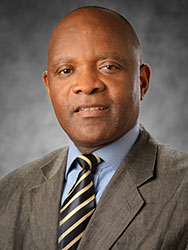Q and A with Dr John Nkengasong, director of Africa CDC and former Fogarty trainee
November / December 2017 | Volume 16, Issue 6

John Nkengasong, Ph.D.
A veteran of more than 20 years at the U.S. Centers for Disease Control and Prevention (CDC), Cameroon-born Dr. John Nkengasong was appointed director of the newly created Africa CDC in early 2017. Previously, Nkengasong served as acting deputy principal director for the CDC's Center for Global Health in Atlanta. He began his career at the U.S. CDC in 1995 as head of the virology lab in Abidjan, Ivory Coast. Nkengasong earned master's degrees in tropical biomedical science and in medical and pharmaceutical sciences from institutions in Belgium, and has a doctorate in Medical Sciences (Virology) from the University of Brussels.
What is your connection to Fogarty?
When I joined the U.S. CDC in 1995, they arranged for me to go to California and train at Berkeley under longtime Fogarty grantee, Dr. Art Reingold. Although brief, my stay at Berkeley and San Francisco had a big impact on my career. I'd spent my entire professional life until then in Europe - at the Institute of Tropical Medicine in Antwerp and the faculty of medicine at the University of Brussels - and my Fogarty traineeship allowed me, for the first time, to work with American scientists. I did research with Dr. Mike Hendry, who was running the California state laboratory and doing work on HIV diagnoses, and at the blood transfusion center in San Francisco alongside Dr. Michael P. Busch. The network I built as a Fogarty trainee has endured over the years, and I was able to use some of the techniques I was introduced to as a trainee in California, in the field in Ivory Coast, which is where I began with the U.S. CDC.
What's the impetus behind the Africa CDC?
In 2013 at a special summit on HIV, TB and malaria in Nigeria, African heads of state recognized that the current public health architecture on the continent, which was put in place in 1947, was out of step with the shifting patterns and burden of disease in Africa, and with the size of the population. There were close to 300 million inhabitants in Africa in the mid-1940s, and HIV wasn't recognized as a disease. Today, there are around 1.2 billion people in Africa and HIV is the number one killer on the continent, but until recently, the continent's public health system was not keeping up with that reality.
In 2014, when Ebola hit West Africa, the heads of state met again and asked the African Union commission to accelerate the establishment of the Africa CDC. For all the human and economic destruction wrought by Ebola, it ended up being the catalyst that pushed African leaders to rapidly advance the concept that they nurtured in 2013 to bolster the continent's public health response, and Africa's continent-wide public health agency was launched in January 2017.
What are the goals of the Africa CDC?
We're systems-focused, not disease-focused. Our mission is to support African nations as they create strong health systems and institutions, and then ensure that they are sustainable, fully functional operations that can be called on to fight multiple diseases. Our operations model is simple: we want member states to establish their own national public health institutes, which will network with regional collaborative centers that we have set up in Nigeria, Kenya, Zambia, Gabon and Egypt. These regional centers will then collaborate with the Africa CDC headquarters in Addis Ababa. Around 20 countries in Africa have already moved on the concept of establishing a national public health institute.
How will the international community benefit?
There are clear benefits to the international community, including the U.S., in supporting the Africa CDC as we build the public health capacity of African nations. To go back to the West Africa Ebola outbreak, if it had happened in Uganda or Kenya, I believe the outcome would have been much different because both countries have robust and enduring relationships with Fogarty, the NIH and other international organizations.
At the Africa CDC, we believe that there's a direct correlation between the responsiveness of a country's health system and the number of international partnerships it has. None of the three West African countries that were hardest hit by the outbreak - Guinea, Liberia and Sierra Leone - had much in the way of international health partnerships, and their response was limited by their lack of human capacity and poor infrastructure.
More than 11,000 people died of Ebola in 2014 and 2015, including one person in the U.S., and several billion dollars were spent to bring the outbreak under control. It's crucial that countries like the U.S. continue to support organizations like Fogarty to help train scientists and build capacity in developing countries - important not only for the countries in which disease outbreaks might begin but also for the national security and economic wellbeing of Americans.
More Information
To view Adobe PDF files,
download current, free accessible plug-ins from Adobe's website.